Saudi fears rise over mystery virus
- Published
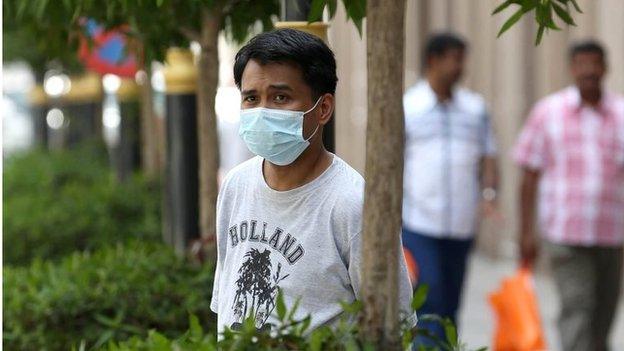
There has been a sudden increase in cases of Mers in Saudi Arabia, but there is no known cure
A mystery virus known as the Middle East Respiratory Syndrome (Mers) has claimed an increasing number of lives in Saudi Arabia, where it has spread to at least five cities. There is no known cure and fear of the condition is growing, as the BBC's Gulf correspondent Mark Lobel reports from Dubai.
Fouad spoke to me from his mobile phone while walking into a shopping centre in Jeddah. As has been his practice in recent weeks he was speaking through a surgical mask that covered his nose and mouth.
A doctor, in his 50s, Fouad said he saw fewer shoppers than usual around him, and that he felt very nervous.
"I wake up every morning and feel stuffy and start to panic - even a tickle in my throat sets me off. We're living on the edge. It's on your mind the whole time," he said.
Fouad has felt like that for several weeks. He is currently living alone, ever since his wife, sister and her young child left the country, afraid of catching the killer virus, Mers, which has cut a swathe through Saudi society.
The coronavirus is from the same family of viruses as the common cold and begins with a flu-like fever and cough but can lead to shortness of breath and pneumonia.
At least 126 people in the country have died after catching it, and more than 463 people have been infected since September 2012.
Front line
Hardest hit have been hospital workers. Fouad knows personally three doctors and a nurse who have recently tested positive for Mers.
All are thought to have caught the coronavirus in hospitals where they work. Two of them were diagnosed when they fell seriously ill and were put on ventilators in ICU.
One of the doctors, however, only discovered she had the virus after requesting the test as a precaution, despite showing no symptoms. After a spell in isolation all four are now perfectly healthy.
There is no cure or vaccine for Mers, and although not necessarily fatal, health experts estimate about a third of those who catch the virus die.
People at most risk of dying are the elderly, weak and those with chronic health conditions.
Yet fears among health workers are high and have risen further after the recent death from the virus of the head of the haematology division, Ayman Hamdan Simi, at Jeddah's King Fahd Hospital.
Mr Simi's three-week fight against Mers ended last Saturday after he suffered kidney failure.
Acting health minister Adel Al Faqih described him as a martyr who died in the line of duty.
Mr Al Faqih was brought in to manage this crisis after his predecessor was sacked without explanation when the Mers death toll increased sharply.
'Close to collapse'
The health ministry said it is working round the clock in collaboration with experts from several countries to eliminate Mers.
"The ministry of health has made tackling this virus a priority," spokesman Dr Khalid Marghlani told the BBC.
"We are currently working with international experts like the World Health Organisation (WHO) and Centre for Disease Control (CDC) to find the best possible solution to stop the spread of the virus," he said, adding the ministry was "committed to transparency on this issue".
A German virologist, who is assisting with those efforts, described Jeddah's health system as "close to collapse".
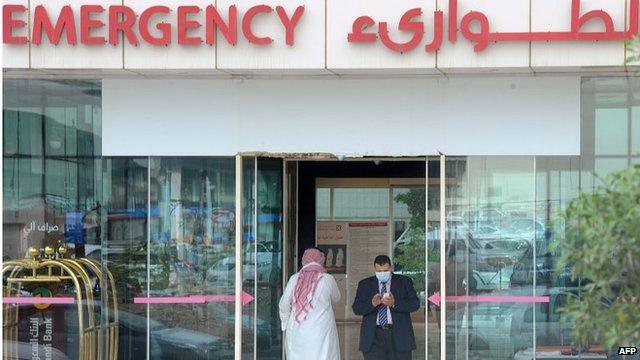
Health workers are among those hardest hit by the virus
Speaking to Science Insider, external, Christian Drosten said that the vast amount of testing for the disease currently being conducted is stretching lab capacity, accuracy and resources.
Mr Drosten said that dirty hospitals are fuelling the epidemic and called for an urgent campaign to improve hospital hygiene.
In the meantime he is encouraged to see increasing numbers of people wearing face masks which he thinks may help curb the number of new infections.
Meanwhile, Saudi Arabia's neighbours in the Gulf are watching on closely.
One leading Emirati business figure, with important financial dealings with Saudi Arabia, told me privately that the Saudi government seems to have failed "to get a grip" on the "disastrous" crisis, that has spread so swiftly across the kingdom.
Lifestyle change
A thousand kilometres from Jeddah, the capital Riyadh has been equally hard-hit, with people dying from the virus almost every day over the past week.
Sanaa, a Riyadh resident, teacher and mother-of-two, said she is considering withdrawing her two-year old from nursery because she is so worried about infection.
She estimates that at least a quarter of her six-year-old's class is already absent.
Sanaa's family barely leave their compound. They have ceased social engagements and trips to the shopping centre to avoid the chance of the children catching the virus, since a nine-month-old died after contracting it in Riyadh last month.
The owner of a brand of gyms in Riyadh and across the country told me that dozens of gym memberships have been cancelled by customers who are worried about catching the virus.
Hakim, a doctor in Riyadh who deals with patients suspected of having Mers, said the government may soon have to take more decisive action to protect people if things continue getting worse.
"We have a situation but no political action," he said.
He thinks the government should consider closing schools, banning gatherings, restricting movement in and out of the country or postponing the Hajj for a period of time.
In the absence of a vaccine, some of Hakim's medical colleagues have chosen to get the H1N1 swine-flu vaccine as a precautionary measure, even though there is no evidence to suggest it provides immunity against Mers.
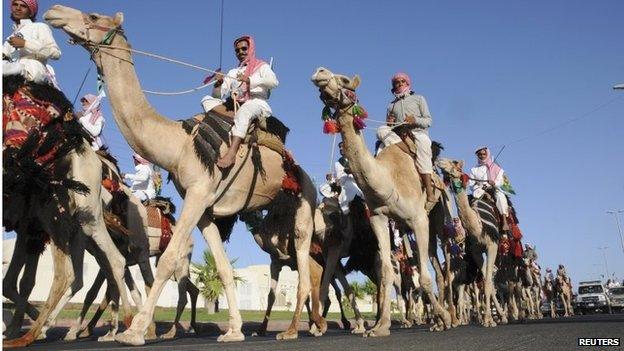
Camels are suspected of passing the infection to humans
Fouad said he has faith in Mr Al Faqih, who has a reputation for getting things done from his work in other government departments and who he assumes was brought in to get a handle on the crisis.
But the doctor holds out little hope for a swift solution.
"What do they know about this disease? We don't know for sure how it's spreading, even which animal is harbouring it, perhaps it's transmitted by food?" he said.
Despite the uncertainties, in Jeddah at least the presence of the virus is becoming a way of life.
"Many people were very worried a few weeks ago, but now it's not visibly bothering people too much," Fouad said.
"They're just living with it."
Names used in this article have been changed to protect individuals' identities.
- Published6 May 2014

- Published5 May 2014
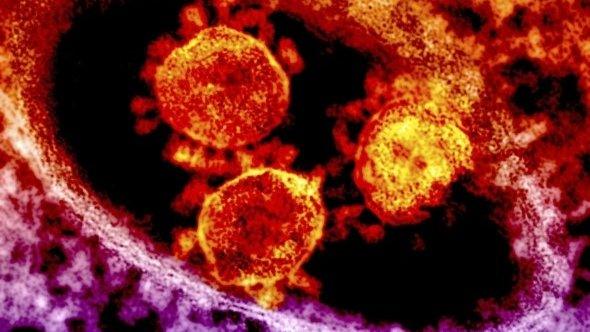
- Published22 April 2014
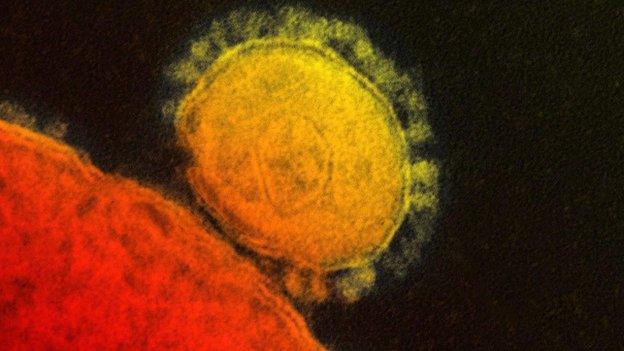
- Published11 November 2013

- Published13 July 2013
